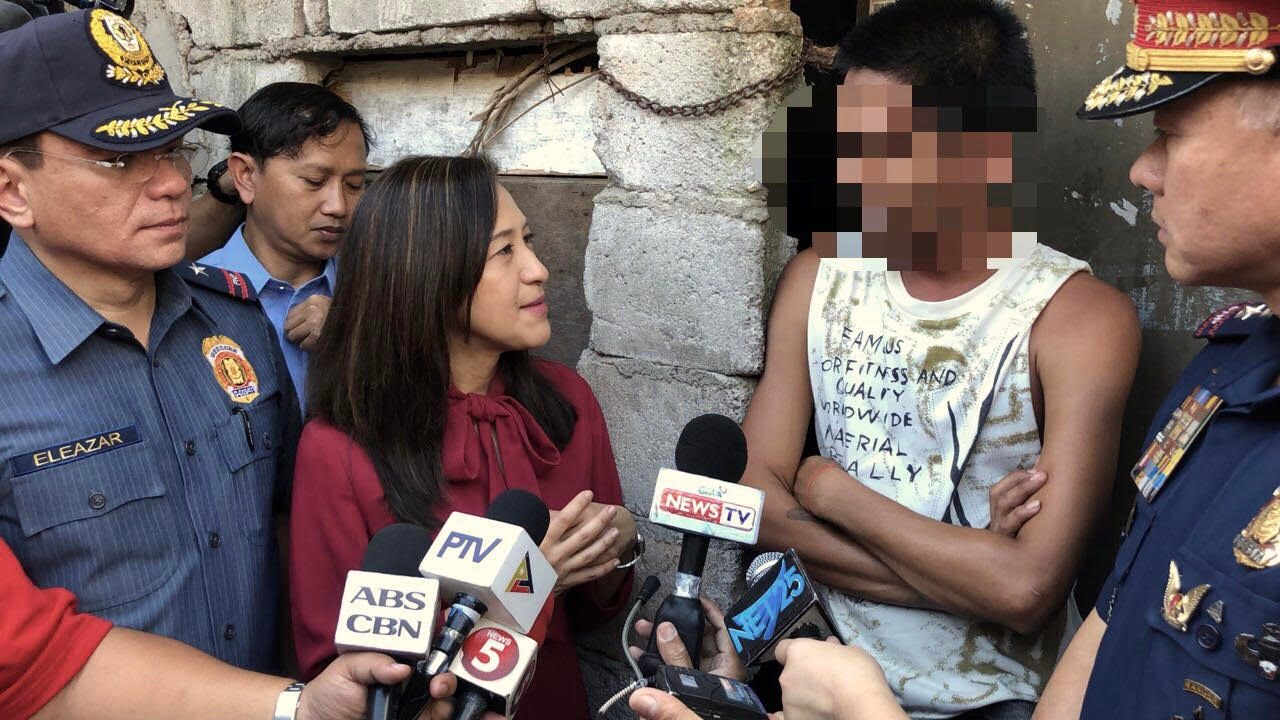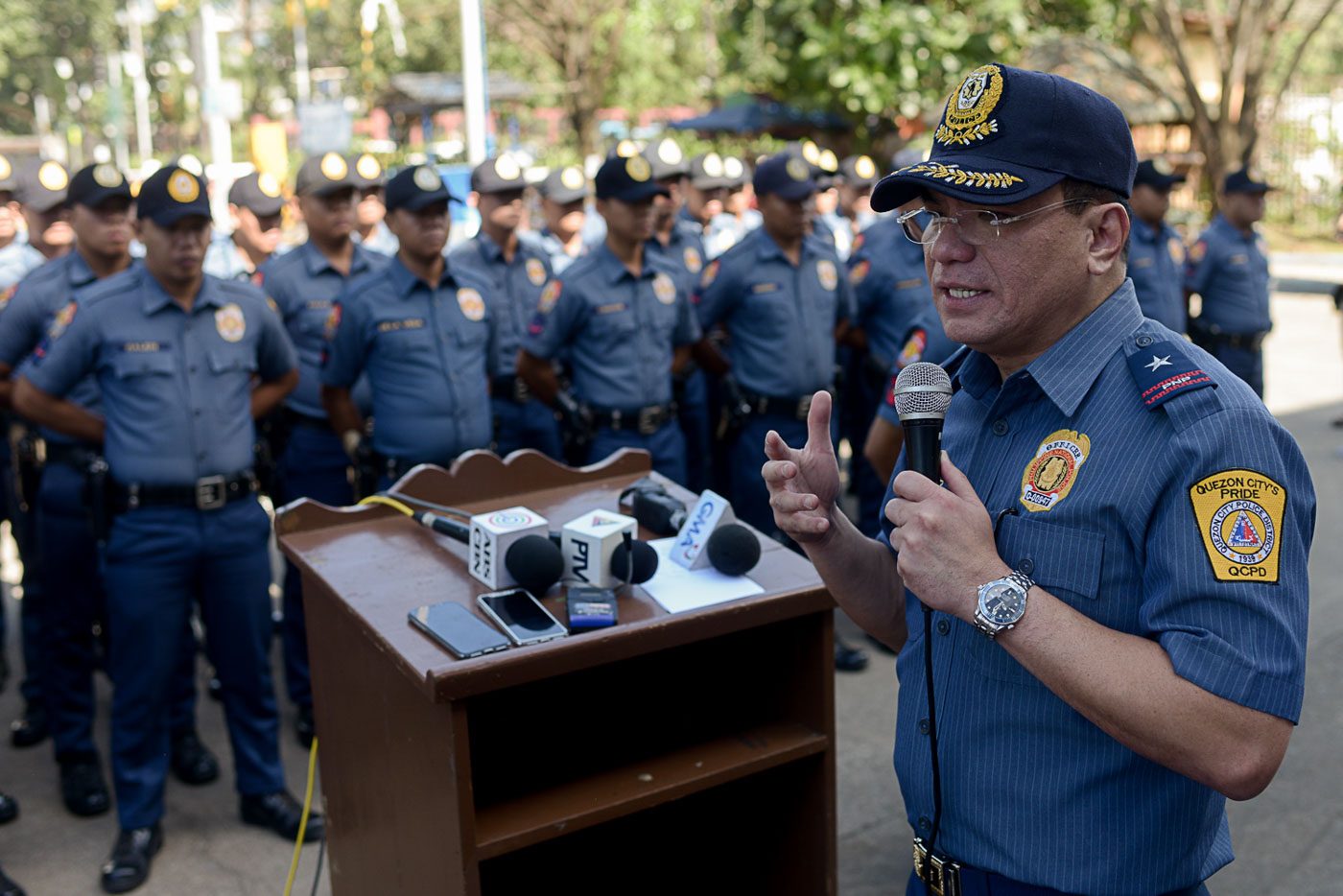SUMMARY
This is AI generated summarization, which may have errors. For context, always refer to the full article.

MANILA, Philippine – Newly-minted “Tokhangers”, 82 of them, roamed the streets of Barangay Batasan Hills on Monday, January 29, as the Philippine National Police (PNP) relaunched its “knock and plead” operations nationwide.
With a barangay drug watch list on hand, Batasan Police Station Commander Superintendent Rossel Cejas led the team of Tokhangers through the narrow Kasiyahan Street in Batasan Hills, together with Quezon City Vice Mayor Joy Belmonte, Quezon City Police Director Guillermo Eleazar, and NCRPO Regional Director Oscar Albayalde.
Among the first persons on the list was Anjo (not his real name), who was allegedly a drug user. After knocking on his door, Cejas introduced his team and explained their intentions. He reassured Anjo that they were only after his cooperation.
“We are here to give you advice,” he said.
Vice Mayor Belmonte followed this with suggestions for rehabilitation, assuming he wanted to change – either a 12-session, community-based rehabilitation, or a 6-month rehabilitation in a facility, all at the expense of the local government. After completing rehab, Belmonte promised him a job would be available for him.
“My goal is for you not to have to think about going back [to using drugs] because you already have a sensible job,” Belmonte said, “not to mention the love of your family, and the support of the community.”
NCRPO Director Albayalde insisted that this was the only way his name would be removed from the drug watch list. But, he also clarified that this does not mean he was an immediate target for arrest.
“This is not a warrant of arrest,” Albayalde told Anjo. “This is not basis for you to be arrested.”
“As long as the authorities observe that you are not using [illegal] drugs anymore, your name will be removed from the list,” he added.
Later Eleazar told the media this is the “true concept” of Tokhang. “Tokhang does not mean arrest, it does not mean ‘nanlaban.’ This is Tokhang – we knocked, and you welcomed us.”

Redefining Tokhang
Prior to the operation, the QCPD director also spoke before the 82 trained Tokhangers to remind them of this – the “correct definition” of Tokhang.
The PNP’s campaign, Project Double Barrel, he said, consists of two approaches: the Lower Barrel and the Upper Barrel.
The Lower Barrel, Eleazar said, was precisely Tokhang. “It is a program where we encourage and persuade those who are involved in illegal drugs to stop their illegal activities.” Connected to this was rehabilitation, both community-based programs, and help from a facility – to save those who want to change.
The Upper Barrel, on the other hand, is “for those who do not heed our call.” This is where police and buy-bust operations fall under.
Eleazar admitted not all policemen understood the distinction between the two, so much so that the term has been used “jokingly” to mean “getting killed.”
“When one is arrested, they say na-Tokhang. When something [bad happens], they say that’s Tokhang. When one threatens, he said, ‘Tokhang-in kita diyan. This is wrong. Tokhang has a very good intention,” Eleazar said.
With the relaunch of Tokhang, Eleazar said, this distinction will be clearer because a separate team has been created solely for the “knock and plead” operations: the Tokhangers.
In Batasan, the Tokhangers will be divided into smaller groups. Two teams will be tasked to operate in each of the 6 barangays in Batasan. Each team will have 4 policemen.
On weekdays, from 8 am to 5 pm, these teams will knock and plead on the doors of alleged drug users listed in each of the barangay’s watchlists. There is no quota, Cejas said. The numbers will rely strictly on the barangay’s list.
To make sure that no one will be harmed in the second iteration of Tokhang, the Tokhangers were detached from the Drug Enforcement Unit. This means that the police personnel responsible for Tokhang will not be the same cops performing police operations. As much as possible, the Tokhangers will even go unarmed when visiting communities.
“Even in the conduct of Tokhang, dapat paramount din yung ating respect for human rights,” Albayalde said. (Even in the conduct of Tokhang, our respect for human rights should also be paramount.)
When asked if body cameras will also be used in Tokhang operations, Albayalde said there were no body cam units available for use yet. In lieu of this, barangay officials are invited to witness Tokhang operations to ensure the procedure is followed correctly.
A cameraman, Albayalde said, will also be assigned to each team to record operations from beginning to end. Video recording of operations will also be the protocol in buy-bust operations and in the serving of warrants of arrest, said Albayalde.
“In the absence of body cameras, we also have the media personnel who want to join us. This is open to all,” Albayalde said.
“Even the members of the Commission on Human Rights can join TokHang – even (during) buy-bust operations if they really wanted to – for them to see how the operations are really conducted by the PNP.” – Rappler.com
Add a comment
How does this make you feel?
There are no comments yet. Add your comment to start the conversation.